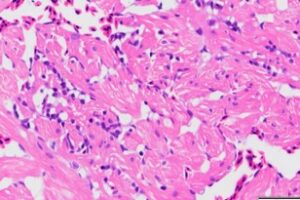Heart of the matter

A new study is helping to tackle cardiomyopathy syndrome in farmed salmon
Cardiomyopathy syndrome (CMS) of farmed Atlantic salmon is widespread and responsible for significant losses. Affected fish may show no external signs other than sudden mortality. Clinical signs, where present, are typically associated with heart failure. Histologically, characteristic changes including inflammatory cell infiltration, cell degeneration and cell necrosis are apparent in the heart muscle.
The primary cause is believed to be infection with piscine myocarditis virus (PMCV), a double-stranded RNA virus. To date, PMCV has not been isolated in pure culture and shown to reproduce disease, and this impairs efforts to develop effective control measures.
Moredun Scientific has recently validated an experimental model of CMS in Atlantic salmon post-smolts. The model is based on injection of fish with PMCV obtained from tissues from clinically affected fish. Tissue homogenates were screened by PCR to confirm the presence of PMCV and exclude interfering viruses causing similar pathologies. Viability of the PMCV preparation was confirmed by demonstration of cytopathic effect using a susceptible fish cell line.

Above: CMS histopathology
In the validation study groups of 40 fish were challenged by intra-peritoneal injection at four dose levels. The study found 100% of challenged fish were PMCV positive at four weeks and 10 weeks post challenge. All control fish were PMCV negative. Experimentally challenged fish showed no clinical signs, and the pathological effect was determined by scoring of histopathological changes in the heart. The model resulted in a substantial increase in heart scores in affected fish. A range of promising clinical biomarkers have also been identified to support PMCV challenge studies.
Learn more about our range of models at www.moredun-scientific.com
Contact Moredun Scientific via info@moredun-scientific.com


